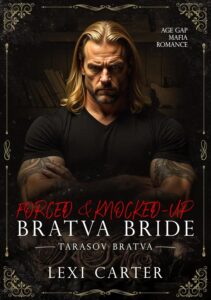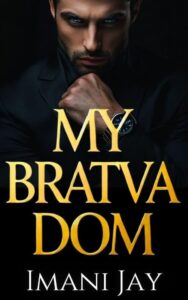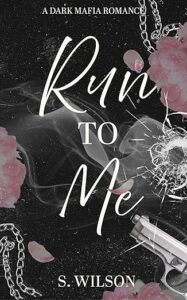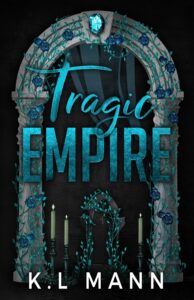11 years old
I never walked without support again.
Things got better, though. Like Danilo had promised.
Within the first week of waking from my coma, I was able to move my arms, and the feeling returned to the upper part of my body. My arms felt weaker than before, but the doctors assured me they would regain their previous strength with training and as my body healed from the accident and surgeries. My lower body didn’t recover the same way, no matter how much I wanted it to and how much Mom prayed. She always told me that it was temporary, and I believed her. I needed to believe her.
Once I felt strong enough, Danilo and a nurse helped me into a wheelchair. Mom started crying when she saw me in it and left the room with a muttered excuse. I peered up at my brother, who held on to the handles, his expression like stone. His eyes met mine, and he gave me a tight smile. “I don’t want to be in a wheelchair, Danilo. I want to walk like I used to. I will walk again, right?”
Danilo stared at me for a long time, a muscle in his jaw twitching, the only movement in his otherwise frozen face. The nurse glanced between him and me, her brows pulling together. She touched my arm, and I looked into her kind blue eyes. “I know this is a lot to take in, Emma. And it’s a little scary, but a wheelchair isn’t your enemy. It’ll help you go wherever you want. There are wheelchairs for every activity. They are lightweight and agile. You can play sports with them and do a quick U-turn. You will be faster than your brother if you get the right wheelchair. And if you prefer more support, you can even get an electric wheelchair. Then you can steer it with a single finger. Isn’t that cool?”
I knew she was trying to cheer me up, to make my situation seem less daunting, but I didn’t want to know anything about wheelchairs. I wanted my legs to carry me wherever I needed to go. She squeezed my shoulder with a compassionate smile. “Once your arms are a little stronger, I’ll bring you one of our lightest wheelchairs so you can get used to it, okay?”
I gave a tiny nod. The moment she was out of the room, I sent my brother a pleading look. “I don’t want to get used to a wheelchair, Danilo. I want my legs. Please.”
Danilo walked around the chair and got on his haunches before me. He took my hands in his. “I’ll do everything I can, Emma, to help you. I’ll look for therapies and doctors worldwide who can help you, but I want you prepared. I want you to learn how to use a wheelchair, and I’ll buy you the best wheelchairs until you find one you like.”
I looked away from him. Why couldn’t he lie like Mom did? Why couldn’t he say that I would one day walk again?
I had trouble maneuvering the wheels. They seemed stuck. My fingers ached from trying to move them. This wheelchair wasn’t easy to steer. It wasn’t lightweight. “It doesn’t work!”
Tears of anger and frustration burned in my eyes after ten minutes of trying to move the light wheelchair the nurse had brought me for practice.
“I think you accidentally engaged the brakes.” She pulled a lever at the wheel, and I could move the wheelchair forward, but as I tried to move it past the bed, my wheel got stuck on one of the legs. I dropped my hands in my lap, pressing my lips together firmly.
Danilo leaned against the windowsill and watched everything with a stoic expression. Mom couldn’t bear seeing me in a wheelchair, so she had left for the canteen with her bodyguard.
“I need to go to the toilet,” I said tonelessly.
“Would you like me or your brother to help you? Maybe it would be good if he learned how to assist you until you can do it without help.”
My eyes widened in horror, and Danilo straightened with a look of shock, torn out of the controlled calm he always displayed around me. He quickly masked it and nodded slowly.
I shook my head. “No. I don’t want Danilo to help me.” My voice broke.
“Maybe your mother?”
Danilo’s mouth thinned.
“She won’t be able to handle it,” I said. Mom had to take care of Dad, which was already incredibly tough for her.
The nurse seemed at a loss. “Well, your family plans to take you home in a week, so we need to figure out how to help you.” She looked at Danilo. “Have you hired a private nurse for her?”
Danilo glowered. “Our situation is special. We don’t appreciate strangers in our home.”
“Then you’ll have to help her. Right now, she can’t do it herself yet.”
Danilo walked toward me, but I shook my head. “No!” I didn’t want my brother to help me undress so I could pee. I didn’t want him to lift me on the toilet. I’d prefer to go back to having a catheter before I allowed him to help me.
Danilo regarded me, but I could tell he wasn’t sure what to do.
My despair rose at seeing him helpless. My big, strong brother.
I swallowed hard. “I’ll practice every day so I can do it myself.”
“You go home in just a week unless your family changes their mind. Your body still has a lot of healing to do, Emma.”
She moved toward Danilo, and his expression became hard. “Listen, I don’t know anything about your world. But I know that your sister will need help in the beginning. Her body’s been through a lot. Her scars need to heal, inside and out. If she does too much too soon, it could set her back. Either you hire someone who’ll help her or someone from your family needs to do it. There are ways to preserve modesty if that’s a concern.” She paused. “And your sister needs a therapist. She needs to get grief counseling to come to terms with what she’s lost.”
I swallowed hard. In our world, people didn’t talk about going to therapy. Getting help for mental problems made you look weak. But at the moment, I felt weak—body and mind.
Coming to terms with what I’d lost… could I? Because sometimes it felt as if I’d lost too much to bear.
“My family will handle it,” Danilo clipped.
I tried to move the wheelchair back and finally got it unstuck. My progress toward the bathroom was slow, and my arms and hands tired quickly. The parts of my body that I could feel ached despite the pain medication. Once inside the bathroom, I froze. I didn’t have the strength to hoist myself out of the wheelchair and onto the toilet seat. I couldn’t even undress the lower part of my body without help. I would have to lift my hips to remove the sweatpants and panties, and that simply wasn’t an option—yet.
Danilo came in. I fought the urge to send him away but lost my fight against the tears of frustration and shame. He stepped up to me and touched my shoulder. “What can I do?” His voice oozed utter control, but I could see the strain around his eyes.
“If you grab me under the arms and lift me, I can try to push my pants down.” The nurses had always done it, so I wasn’t entirely sure if I could do it myself. “Then you’ll have to put me down on the toilet.”
I closed my eyes, hating every moment of this.
“Will I hurt her?” Danilo asked the nurse.
“I’ll take a look, but it’s been five weeks since her surgeries, so everything should be fine as long as you move slowly and carefully.”
I opened my eyes to see Danilo looking at my face with utter concern. He grabbed me under the armpits and lifted me a few inches from the wheelchair. It hurt, mostly in my hips and shoulders, but I stifled a noise. I reached down and tried to push my sweatpants down, but the waistband made it difficult. I couldn’t put enough strength behind the movement because of my awkward position and tired muscles. Eventually, the nurse had to help, and Danilo set me down on the toilet seat. They both left, but it took me several minutes before I could finally let loose.
I didn’t immediately call for Danilo when I was done. I felt angry at my body for failing me, angry with the man who caused the accident, and angry with the doctors who couldn’t help me. But overwhelmingly, I felt utterly heartbroken and sad. Nothing would ever be like I was used to. How could a therapist change any of it? Would they make me forget reality?
“Emma?” Danilo called.
“Come in.” My voice was small, and tears had started streaming down my cheeks. I didn’t look up as Danilo came in. His shoes appeared in my line of vision. He gripped me and hoisted me up. I managed to pull up the sweatpants so they covered me. Danilo put me down in my wheelchair. I moved toward the wash basin and managed to turn the water on while Danilo watched me. I cleaned my hands, then leaned back in the chair.
“Progress,” the nurse said with a smile. I didn’t return the smile.
Eventually, she left. Danilo pushed me back into the bedroom, then crouched before me again. “Emma, you are strong. Soon, you’ll be able to do this alone, but as long as you can’t, I don’t mind helping you, okay?” I looked into his eyes and gave a small nod.
Four weeks after I had woken up from my coma, I returned home against the recommendation of the doctors. They thought I should go to a rehabilitation clinic, but Danilo and Dad weren’t confident that they could guarantee my protection there. All my therapy sessions would either take place at home or Danilo would drive me there.
When I finally came home, some feeling had returned to my legs. In the beginning, it was mainly as a tingling like the sensation of feeling returning to your limbs after falling asleep, only that my legs didn’t “wake” up, and the tingling felt more like a bothersome prickling. Despite the sleepless nights that this insistent prickling caused at first, it was better than the numbness of the first few days and weeks. Entirely numb areas remained like my toes, and my calves only signaled a sort of dull pressure when I put my weight on them or something very heavy rested on them. Apart from that, they didn’t register touch.
My home didn’t feel like a home anymore because I couldn’t even get to my bedroom on the upper floor without someone carrying me there. I couldn’t use the toilet without help because there weren’t handles yet. The sinks were too high for me to reach while sitting in the wheelchair. The list was long. Apparently, Mom didn’t want the house to be made accessible because that would equal accepting that I would have to use a wheelchair forever. Dad was already too poorly to bother getting involved in the argument. But a week after my return, Danilo lost it.
“As Underboss of this city, my word is law, Mother, for you and everyone else, and I’ve made the decision to turn this house into a place where Emma feels welcome. Tomorrow, craftsmen will arrive and start their work.”
Mom was stunned into silence, and I felt relieved. The past few days had been a string of things I couldn’t do because I couldn’t reach them with my wheelchair. It had made me feel left out and helpless, even more so than in the hospital.
Once the elevator was installed and everything else was made accessible, I could move around the house without constant help. Everything still took a long time, and the shelves remained out of my reach, but I felt like I had regained a tiny bit of my freedom. Of course, Mom or Danilo was always home, but I felt a little more like my old self.
Every day, someone came over to do physical therapy and massages with me, and eventually, even a therapist visited me to help me cope. Despite Danilo’s aversion to strangers in the house, the Outfit simply didn’t have someone who specialized in helping someone with my type of spinal injury.
They were the only people I saw except for bodyguards, my family, and the doctors. Danilo wanted me out of the public eye until I felt stronger. Sometimes I wondered if my mental state was the only reason I spent my days at home.
I didn’t know how much of my condition was public knowledge. Many of my friends had written in the first few weeks after I woke up, but it soon became obvious that their curiosity was the reason and not true concern or friendship.
Eventually, when I didn’t reveal more of my condition, most of them stopped writing. Only my closest friend Giorgia remained from my group of friends in Indianapolis. She, however, treated me as if nothing had happened.
When she visited me the first time, two weeks after my release from the hospital (Danilo hadn’t allowed her to see me sooner), she walked straight past my concerned brother and hugged me tightly as if nothing had changed. Her mane of curly red hair tickled my face. She pulled back and smiled at me, then looked at the electric wheelchair in one corner of the foyer. I almost never used it. “Can I try it? I want to know how it is for you.” She grimaced, then tilted her head, her blue eyes flickering with worry. “Was that rude? My mother said I should be careful not to be rude, but we’ve been friends forever. I mean, you know how I am.”
I burst out laughing for the first time since my accident. “You are you, Giorgia, and I don’t want you to act any different.”
Giorgia sat on the electric wheelchair with her tongue wedged between her lips as she tried to figure out how it worked. I preferred the agility of my manual wheelchair. Danilo stood a few steps from us. He hovered a lot during the day, which meant he had to work at night. I wasn’t sure when he ever slept. Giorgia let out a little screech when the wheelchair suddenly surged forward, and she almost collided with my brother. He cocked an eyebrow at her.
I laughed again. The sound felt foreign, and my ribs actually ached.
“Whoa, this thing is fast.” She turned the joystick, and the chair moved to the right, almost striking the staircase. She sent me a wide-eyed look. “Is this made for racing?”
I bit my lip and shook my head. “It takes practice, but I prefer this chair.” I patted my light, agile chair. She moved the wheelchair back to the corner, then she stood.
I felt a pang and had to swallow hard.
Giorgia’s expression fell, her eyes softening. I guess my face showed how much the sight of her simply getting out of the wheelchair hurt me because it would never be like that for me. My physical therapist had promised me we would work with leg braces as soon as my body allowed it, but he had also been very clear that with the damage my spinal cord had sustained, the chances of me walking without support ever again were almost nil.
“I’m sorry.”
I shook my head. She had nothing to be sorry for. “You made me laugh for the first time in weeks.”
Giorgia came over to me. “I thought we could watch a movie and eat popcorn?”
I nodded, so we moved upstairs to my room in the new elevator. Danilo finally left us alone.
We usually watched movies on my bed. Giorgia plopped down as usual, then sat up with an uncertain expression. “Or do you prefer to sit on the sofa?” She motioned to the sofa off to the side. I hadn’t used it since my accident. The TV could be turned either way.
“No,” I said, then wheeled closer to the bed. I arrested the brakes. I still had trouble getting from the wheelchair into bed, even if it was a new, lower model. Giorgia watched me as I tried to hoist myself into bed. After three tries, I finally managed to land my butt in bed. I used my arms to scoot backward until my back hit the headboard. Then I leaned back and had to take a deep breath. My body ached, and I felt tired from this brief movement.
Giorgia held the remote in her hand but hadn’t turned on the TV yet. “If you ever want to talk, I’m here.”
I nodded. I preferred talking to my therapist. It was easier to share my darkest fears with a near stranger than with the people I knew. “I want to watch a movie.”
Five minutes later, our maid appeared with a big bowl of popcorn and glasses of Coke.
As Giorgia and I watched the movie, shoulder against shoulder, I felt like the old Emma for the first time since waking from the coma.
One day, a few months after the accident, when it became clear that I’d never dance again, Mom threw away all my ballet clothes.
I only knew because she hadn’t properly closed the drawer where I kept my leotards, and when I checked, I found it empty. I opened the other drawers with my ballet clothes, but they too were bare. Everything had disappeared without a word, without an explanation.
But I knew it was Mom. She’d sometimes mentioned how much I had to miss ballet and that I’d certainly be able to do it again soon. She’d probably been more devastated about the end of my ballet career than me. Still, I felt sorrow as I stared at the empty drawer. It symbolized another part of my old life I’d lost, another door that ultimately closed for me.
I’d enjoyed ballet, the grace and discipline, the costumes, the music, but it hadn’t been my dream—until it had been taken from me. I would have loved to decide when I’d stop on my own terms… but I didn’t have that choice. I’d have to come to terms with it as I had to do with many other changes in my life. In the beginning, life had felt like a chain of things I couldn’t do anymore, but slowly, I discovered new things that gave me moments of happiness. Doing things with Giorgia and doing crafts like drawing, pottery, and origami.
What I missed more than dancing was the freedom the ability to walk gave you. I’d never realized how many stairs my daily routine included and how high up many of the things were that I needed on a daily basis. The first time I’d entered the kitchen to grab a glass of water after I’d returned home, I had been unable to reach the cupboard and had been left staring at it until our cook came in and helped me.
After that, she put glasses into a low cupboard so I could get them. It wasn’t the last time I couldn’t reach something. My family and I had to adapt to my new abilities. Step by step, our home turned into a place where I could do many things independently, but I knew that if I ever attended social gatherings again, things would be a new challenge.
About two and a half months after my accident, I got the first taste of what life with a disability meant in our antiquated, traditional world, and this event almost let other people’s inability to cope with my disability become the way I also handled it.
I had been engaged to the eldest son of the Cincinatti Underboss since I was only four years old. Federico and I had only met a couple of times, and I had never given our bond more than a fleeting thought. Marriage was still a distant concept because I didn’t care much about boys yet. When Federico’s father came to visit without his son, I immediately had a bad feeling.
Danilo had told me to stay upstairs, but I had been utterly sheltered since my accident, and I finally wanted to get a glimpse of the outside world, even if it was only through brief small talk with Federico’s father. Danilo’s eyes strayed to me as I emerged from the elevator when Federico’s father entered. The concern in Danilo’s eyes triggered my own anxiety. How would the man react to my disability? He barely glanced my way when he came in, his eyes passing me by without a single greeting. “I need to talk to you and your father alone, Danilo. Without your sister.”
My grip on the wheels tightened, probably thickening the newly formed calluses on my palms. I made myself smaller under his continued disregard of me.
Danilo’s lips thinned, and the hard look in his eyes indicated how fragile his controlled mask was. “Go ahead. My father is at his desk. You know the way. I’ll join you in a moment.”
Mom strolled out of the living room. Federico’s father gave her a quick nod before he stalked down the corridor toward Dad’s office.
“What’s going on?” Mom asked, pursing her lips. She’d worn a nice dress and put her brown hair in a sleek bun at the top of her head. “I prepared afternoon tea for all of us.”
“You should wait with Emma in the living room. I have a feeling that things won’t be pleasant, and there won’t be an afternoon tea.”
I frowned at Danilo, but he only smiled tightly at me. Mom, however, had paled considerably at his statement.
Mom and I moved into the living room and sat at the coffee table, which our maid had filled with cakes and cookies for our guest and us.
I bit my lower lip, then glanced down at my calloused palm, tracing it with my fingers. I’d never had calluses on my hands, only on my toes from going on pointe. The latter had faded, and new ones had formed. Since my accident, it often felt like my heart would need calluses too to protect itself from what was to come.
“What do you think he wants?”
Mom’s eyes rested on my palms. “We need to make sure your hands don’t look like this. It’s not pretty. Maybe you need to use your electric wheelchair.”
I turned my hands over and cupped my thighs. “It’s too big, and I don’t like the sound it makes.”
Raised voices silenced me. I tried to understand what was being said, but Dad, Danilo, and Federico’s father seemed to all be screaming at the same time.
One of our bodyguards entered with a curt nod and positioned himself beside the door. He had taken over after my old bodyguard had been removed. He’d caused the accident because he was drunk on the job. I didn’t like thinking about him. Sometimes I hated him for what he’d done to me, and sometimes I felt almost guilty because he was dead now and not from the accident. My brother had killed him as punishment.
The shouting increased. Federico’s father appeared in the foyer, but he never came into the living room. Instead, he hurried toward the front door with a bright red face, looking like he couldn’t wait to get away.
“Don’t ever contact me for help again!” Dad roared, then started coughing horribly. The front door fell shut, and for a few heartbeats, nobody said anything. Only Dad’s desperate coughing and wheezing could be heard. Danilo appeared in the doorway, his face red, his hair tousled, and he had a thunderous look in his eyes.
“What’s wrong?” Mom asked fearfully.
“They canceled the engagement!” Dad sputtered as he appeared next to Danilo in the doorway, his face turning increasingly red as well.
Mom rose from the sofa, her hand covering her heart as if the words had broken it. “They can’t!”
“They can,” Danilo said quietly, his eyes on me, not our mother. “These are extraordinary circumstances, so no one will blame them, even if it’s absolutely dishonorable.”
Mom covered her face and began to cry bitterly. Dad came in and wrapped an arm around her to console her while I made myself smaller in my wheelchair, wishing I could disappear like some people seemed to prefer.
The engagement was canceled.
Another part of my old life was gone. What would happen now? Girls in our world needed to marry if they wanted to be accepted. I wanted to be part of our world and have a future in it like every other girl did, but would they allow me that?
Danilo came in and touched my shoulder. “This isn’t your fault,” he murmured. I tilted my head, wondering why that was the first thing out of his mouth.
He grimaced, looking exhausted. “You know what I mean.”
I swallowed and nodded even though I wasn’t sure. I was confused and scared and sad. I was too many things at once. “I do.”
I understood the meaning behind Danilo’s words, but maybe not in the way he wanted me to. I understood that people in our backward world thought something was wrong with me now. They valued certain beauty standards that I would never be able to fulfill.
“We’ll figure something out,” Danilo promised, squeezing my hand. Mom sobbed in the background as Dad tried consoling her.
My brother held power. I saw it in the way people looked at him. He’d certainly be able to make people act a certain way around me, but he wouldn’t be able to change their thoughts.
Mom hadn’t calmed down for a week, and Dad’s rage lingered even longer. Danilo was too controlled to show me what he felt. And me?
I had almost let the cancellation shove me back into the dark hole I’d been stuck in for the first few weeks after the accident. Even my therapist couldn’t pull me out. I’d felt worthless, out of place, and lost. I’d thought the wheelchair really meant the end of all my hopes. I’d thought I would be shackled to it and saw it as a burden when, in reality, it gave me freedom.
I had focused all my energy on physical training again, up to the point of utter exhaustion. I had to increase my painkillers to be able to work as hard as I needed to. I wanted to force my body to comply with my demands.
After several months of intensive training, my legs could hold me up for a few seconds if I held on to something. Countless hours of rehabilitation had given me a tiny piece of my old freedom back, but over time, I also realized that no matter what I did or how hard I trained, I wouldn’t walk without support like I used to. I would never comply with the beauty standards of our world again. The effects of the accident would always be visible in my gait, and I’d likely have to always use a wheelchair. I’d reached the end of what rehabilitation could do. My spinal cord wouldn’t miraculously heal itself. Some damage would always remain. It was the harsh truth Mom had wanted to hide from me, the harsh reality that was no longer a dark prediction, yet my daily life was harder to stomach for everyone around me than for myself. Acceptance didn’t come easily. It was more painful than the physical therapy, but its effects were far more rewarding.














